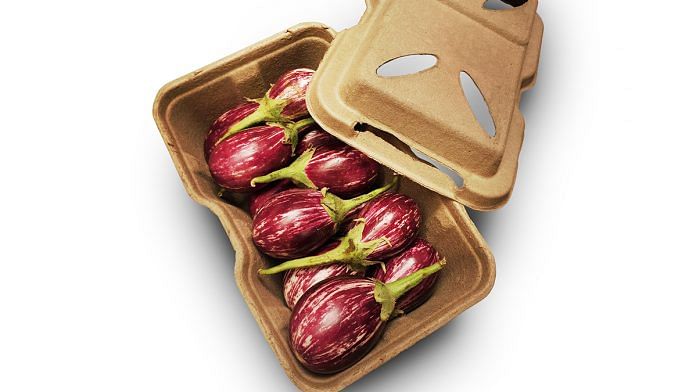These are innovations needed desperately in India, which generates an estimated 1 lakh metric tonnes of solid waste daily
New Delhi: Imagine a takeout where you can eat the box once you are done with the meal. The alternative would be throwing it away with the comforting knowledge that it won’t fester in our oceans for decades, choking marine life, or poison the food chain of our strays.
A host of companies across India are churning out green tableware and packaging containers made from waste, a welcome intervention for a country that generates an estimated 1 lakh metric tonnes of solid waste daily and doesn’t have a disposal system capable of handling it. Other companies, meanwhile, seek to tackle the problem from the other end, tapping food products to make cutlery that is edible.
BIO-LUTIONS, a Germany-based company with operations on the ourskirts of Bengaluru, derives products like trays, boxes and other kinds of packaging from agricultural waste sourced from farmers in the nearby villages of Mandya and Tumkur.
Also read: Indian cities are choking but there have been just 6 air pollution convictions in 2014-16
The company’s partners include three Indians, Kurian Mathew, Kurian George, and George Thomas.
Green and chemical-free
According to spokesperson Priti Salian, BIO-LUTIONS shuns processes like bleaching and softening to ensure the final product is chemical-free and easily biodegradable.
“The water-holding capacity of our tableware is about 8-10 hours, which is more than industry standards,” Kurian Mathew added.
The raw material driving operations at BIO-LUTIONS offers the added incentive of curbing crop burning, an unhealthy farming practice said to be a big factor in the suffocating smog that has been enveloping north India every winter for the past couple of years.
“The agricultural waste that farmers previously burnt is now being sold to BIO-LUTIONS,” said an executive from Organic Mandya, a Mandya-based farmers’ initiative producing organic agro-based products.
Another such company named Chuk is based in Faizabad, Uttar Pradesh, and makes “brown” tableware from bagasse, the pulpy residue left after sugarcane is drained of its juice.
“We acquire bagasse from sugar mills around Faizabad and use it to make biodegradable tableware,” said Swati Aggarwal, a spokesperson for Chuk.
Guilt-free cutlery
The offshoot of a paper-making company, Chuk says their buyers include Haldiram’s and Indian Railways. Their goods are priced at Rs 1-7 a unit, to keep costs on a par with those of plastic products, the spokesperson added.
Hyderabad-based Bakey’s Food Private Ltd, which makes edible cutlery from sorghum, rice and wheat flour mixed with hot water, began with a man’s quest to avoid the unwitting consumption of plastic that reportedly happens when one eats or drinks from utensils or containers made of the product.
The company, founded by Narayana Peesapathy, a former senior scientific officer at International Crops Research Institute for the Semi-arid Tropics, an agriculture research organisation, makes edible and flavoured bowls, spoons and plates one can consume as a part of the meal or afterwards. They can also be thrown away without guilt as their organic nature lets them decompose quickly.
Another such company, Mumbai-based Pappco Greenware, supplies eco-friendly tableware to several multi-national corporations like coffee chain Starbucks, but imports most of it products from China. They claim to sell products priced at Rs 1-5/unit, saying their ultimate aim is to reduce the carbon footprint of the consumer.
Despite a larger global push to save the planet and shun plastic – several cities and states across India have banned plastic bags as a first step — some experts remain sceptical about the long-term success of companies manufacturing alternatives.
Experts sceptical
Most say scalability may prove a problem area, as it will take time for the newer materials to gain currency.
“This is not the first time somebody is taking this kind of an initiative…the problem arises when these businesses have to scale up to become mainstream,” said Centre for Science and Environment deputy director general Chandra Bhushan.
For that, such products and their underlying technology needs to be made easily accessible, he said. “Only then can these players and the public create an ecosystem where the products can become the consumers’ first choice,” he added.
Environmental expert Dharmesh Shah said the manufacture as well as use of plastic was unlikely to decrease till the raw material stayed subsidised.
“The oil used to make plastics is highly subsidised. With the low cost of production, the scope for its availability will also be high,” he added.
The companies, meanwhile, are counting on increased environmental awareness to establish themselves as long-term players.
“Since we started production in January, we hope to break even in three years,” said Aggarwal of Chuk.
“Due to competitive pricing, our products are priced on a par with plastic products, which reduces the profit margin. We are relying on mass consumption to gain profits,” she added.
“We can only become popular if the end consumer refuses to be served in plastic,” she said.
“Since it is for their benefit, they need to be aware. An increased demand will help us serve more people. With government initiatives like the plastic ban, we have hope that the end consumer will say no to plastic,” she added.
Also read: Long exposure to air pollution can slow down your brain’s functioning, says new study
Salian of BIO-LUTIONS laid out a similar expectation – that the demand for their products will only increase when people ask for tableware not made of plastic.
BIO-LUTIONS had been running a pilot plant for the last year and a half, she said, so profit was not the motive so far. However, now, partner Kurian Mathew says they hope to be making profits within a year.




Superb article…..can u please guide me complete details regarding edible cutlery manufacturing
Soniya very well written …..This innovative idea of disposing solid waste should be promoted in all over the country. It’s really a great idea to bring awareness among the people….keep writing such articles …..